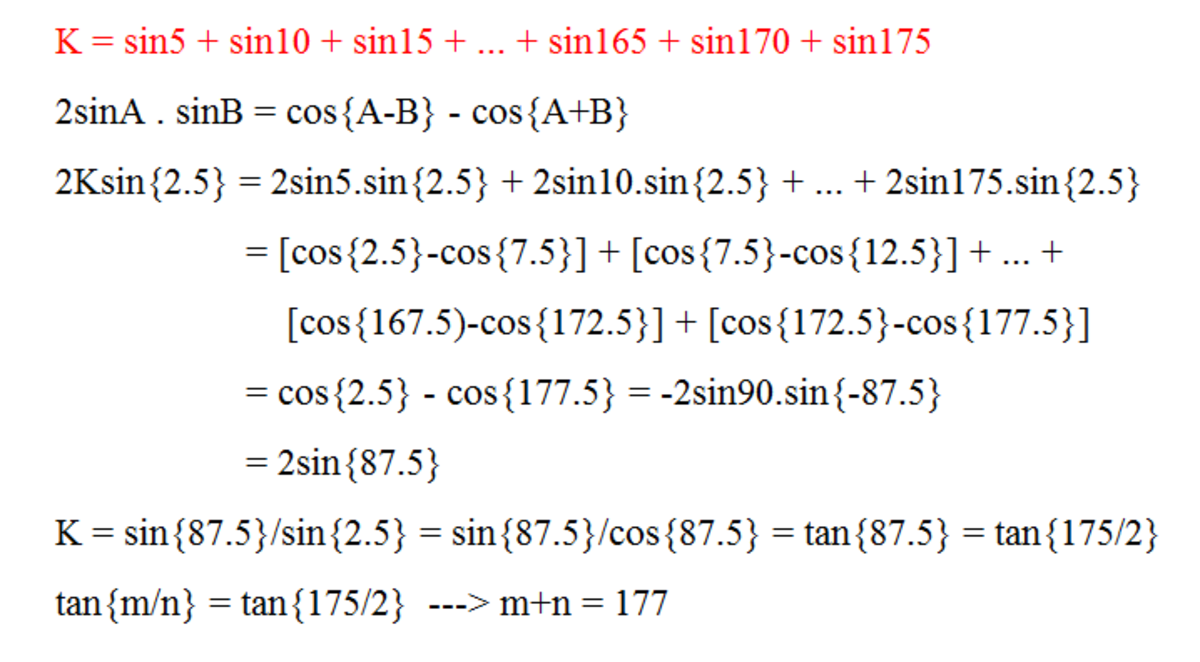100 Followers Problem
k = 1 ∑ 3 5 sin ( 5 k ∘ ) = tan ( n m ) ∘ .
The equation above holds true for coprime positive integers m and n , where n m < 9 0 . Find m + n .
This section requires Javascript.
You are seeing this because something didn't load right. We suggest you, (a) try
refreshing the page, (b) enabling javascript if it is disabled on your browser and,
finally, (c)
loading the
non-javascript version of this page
. We're sorry about the hassle.
2 solutions
Nice solution, did the same, only different by one step, perhaps simpler. Instead of using the half-angle tangent substitution, maybe it is easier to put sin ( 5 o ) = 2 sin ( 2 . 5 o ) cos ( 2 . 5 o ) and cos ( 5 o ) = 1 − 2 sin 2 ( 2 . 5 o )
Log in to reply
Thanks, I will use this to shorten the solution.
Also, when you multply below and above by the conjugate, the result is the imaginary part of 2 − 2 cos ( 5 o ) 2 i sin ( 5 o ) . There is no 1 − cos 2 ( 5 o ) above.
Log in to reply
Thanks a lot.
Done the same. Although i remember direct result of summation of sine and cosine when Angles r in AP . you derived it sir Upvoted!

S = k = 1 ∑ 3 5 sin ( 5 k ∘ ) = k = 1 ∑ 3 5 ℑ [ e 5 k ∘ i ] = ℑ [ k = 1 ∑ 3 5 e 5 k ∘ i ] = ℑ [ e 5 ∘ i ( 1 − e 5 ∘ i 1 − e 1 7 5 ∘ i ) ] = ℑ [ 1 − e 5 ∘ i e 5 ∘ i − e 1 8 0 ∘ i ] = ℑ [ 1 − e 5 ∘ i e 5 ∘ i + 1 ] = ℑ [ 1 − cos 5 ∘ − i sin 5 ∘ 1 + cos 5 ∘ + i sin 5 ∘ ] = ℑ [ 2 − 2 cos 5 ∘ 2 i sin 5 ∘ ] = 1 − cos 5 ∘ sin 5 ∘ = 1 − 1 + 2 sin 2 2 . 5 ∘ 2 sin 2 . 5 ∘ cos 2 . 5 ∘ = cot 2 5 ∘ = tan 2 1 7 5 ∘ By Euler’s formula: e x i = cos x + i sin x where ℑ ( z ) is the imaginary part of z . Summation of geometric progression Multiply up and down with 1 − cos 5 ∘ + i sin 5 ∘
⟹ a + b = 1 7 5 + 2 = 1 7 7
References: